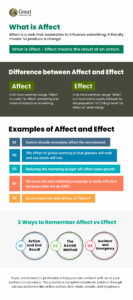Understanding the difference between affect and effect will help you improve your writing. Affect is about influencing something. For example, the economic downturn will affect many businesses. On the other hand, an effect is the result or outcome of something. For instance, the effect of regular exercise is improved health.
Affect vs. Effect
Many people, including some native English speakers, frequently get confused between the words ‘affect’ and ‘effect’. These two words sound and look alike, but in reality, they are distinct and have discrete meanings. But if you know the original meaning of the words ‘affect ‘ and ‘effect’, then you can properly include them in your sentence without changing the context. In general, affect is usually a verb, while effect is a noun. To learn more about the usage of the words ‘affect’ and ‘effect’, continue reading this blog. Here, for your understanding, we have explained the meaning of affect and effect, when to use them in your writing, and the differences between affect and effect.
Affect and effect are two words that sound similar but have different spellings and meanings. As a result, they are homophones. You can, however, use these words in the context of their various meanings in your content at the appropriate location.
Also read: The Importance of Grammar in English

What is Affect?
Affect is a verb with the following meanings
- to act on
- to touch the feelings of
- to produce a change in
- to have an impact on something
- to move emotionally
If you want to express a change or describe an action, you can use the word ‘affect’ in your sentence. Influence, change, alter, impact, and modify are some common words that have a meaning that is similar to affect.
Particularly, when referring to the display of emotion, you can also use affect as a noun. For instance, that kid’s facial expression has a humorous affect.
Read More – Fantastic Cause and Effect Essay Topics for You to Consider
Examples of Affect
Find here a few examples of ‘affect’ in a sentence.
- The cyclone affected the crops.
- How does smoking affect your lungs?
- The war has affected the country’s economy.
- Technology is affecting the way humans live.
- The dropped catch affected the result of the game.
What is Effect?
Effect is a noun with the following meanings
- Consequences
- Result of a change
To highlight an event or to point out a thing, you can use the word ‘effect’ in your sentence. Usually, the word ‘effect’ is used at the time of discussing the results. The effect can be used in two different contexts, either positive or negative.
Specifically, the word ‘effect’ can follow these words: the, any, an, into, on, take, or.
Especially, you can use effect as a verb when you mean to accomplish something or to cause something to occur. For example, I hope that the President will effect change in his country.
Also Know: Hard Words to Spell in English
Examples of Effect
The following are a few examples of ‘effect’ in a sentence.
- The effect ofthe Tsunami was devastating.
- Did the noise have an effect on your sleep?
- The medicine does not have any side effects.
- The effect of war is enormous.
- Exercise has positive effects on the body.
What is the Difference between Affect and Effect?
To know the difference between affect and effect, check the comparison table presented below.
| Affect | Effect |
| Affect is a verb i.e., the action performed. | Effect is a noun i.e., the result of the action performed. |
| To act on something to cause a change is Affect. | When something is done, the change that results is Effect. |
| Affect is used to influence a change in something. | The effect is used when one thing affects another. |
| Affect is more commonly used as a verb and less commonly used as a noun. | Effect is more commonly used as a noun and less commonly used as a verb. |
| Affect Examples:
1. The cold weather affected his skin. 2. The road was badly affected by the snow.
|
Effect Examples:
1. Drugs have lethal effects on the human body. 2. The snow had a predictable effect on traffic. |
Effective Ways to Use the Words Affect and Effect Properly
Mostly, we use affect as a verb and effect as a noun.
If you can substitute ‘affect’ with another verb of similar meaning, then it is predicted that you are using the right word.
Say, for example,
The cyclone affected the crops.
This sentence can be rewritten as “The cycle damaged the crops”. Here, ‘damage ‘ is a verb that is used in place of affect. However, both words produced the same meaning: “to have an impact on something”.
If you can substitute ‘effect’ with another noun, then it is predicted that you are using the right word.
Say, for example,
Her sunburn was an effect of exposure to the sun.
Another effective way to say this sentence is “Her sunburn was a result of exposure to the sun”. Here, the noun ‘result’ is replaced in place of effect, and yet the meaning remains unchanged.
Also, See – How To Focus On Reading
Affect vs. Effect- How to Remember the Difference
If you often get confused between affect and effect, then simply have the word ‘RAVEN’ in your mind to remember the difference between affect and effect.
The expansion of RAVEN is
R – Remember
A – Affect is a
V – Verb
E – Effect is a
N – Noun
This short form will help you to easily spot the difference between the two words.
Another effective way to think of the variation between affect and effect is by using mnemonics for recall. Affect starts with A, which means action. We know that a verb refers to action, and so have in mind that Affect is a verb.
To remember the word ‘effect’, consider the common phrase “Cause and Effect”. Here, the cause ends with an E, and effect starts with an E. The Cause not only leads to the effect, but also the E in the cause leads to the E in effect. So, with this simple trick, you can easily remember which spelling to use – affect or effect.
Conclusion
English is an interesting language with a wide range of homophones and amazing words. So, it is common for people to get confused about which word to use and in what place. We hope you now have a clear understanding of the meaning and the usage of the words affect and effect. If you know the original meaning of those words and when to use the right word in a sentence, you will not end up in any confusion. In case you face any difficulties with the language, approach us immediately. We have experts to offer English assignment help online. With their guidance, you can improve your vocabulary and also complete all types of assignments that are related to the English language.




